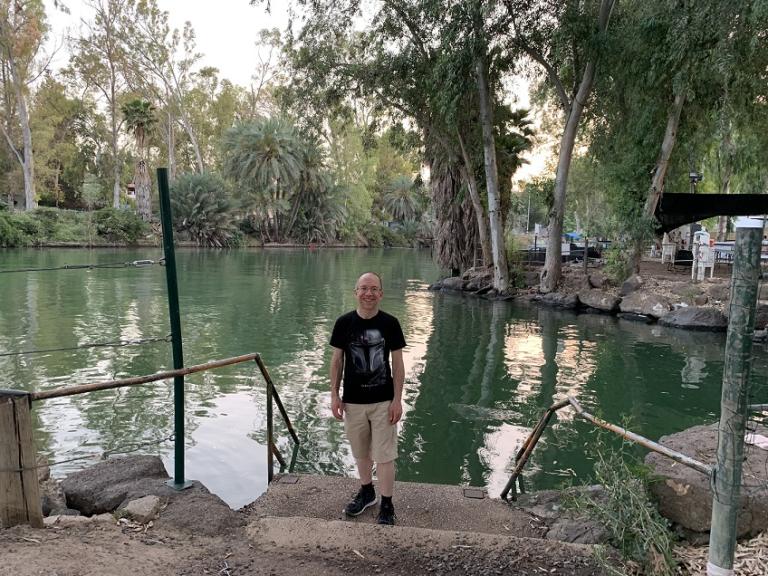I see the relation of Jesus and John the Baptist as very important historically and theologically. You are of course right that some of John’s disciples became Jesus’ disciples, though I am not sure if their history with John would make them continue his baptizing work when they transferred to Jesus, if Jesus was not in favour of it! I take it that Jesus was a ‘baptist’ (John 3:25,4:1) even though the hands-on work of baptizing was done on his behalf by his disciples (as was probably also the case later with Paul and his team of companions). I think there is some reason to think that Jesus’ baptizing may have been embarrassing to early Christians, since it could be argued, and may well have been argued by some followers of John the Baptist, that the one who baptizes is greater than the one baptized; Jesus could have been seen as John’s disciple, as ‘he who comes after me’. John’s gospel clearly wants to refute that idea; see John 3:26-36, and I suspect that John 4:2 is the evangelist distancing Jesus from John in response to this discussion. We see not only John, but also Matthew responding to the same sort of question in 3:13-15.
New textual and archaeological evidence on "Yochanan HaMatvil," or "John the Dipper," including the Suba cave west of Jerusalem.I have uploaded a much shorter private camera version of this lecture before but this one has the slides--they are not the best quality but better than nothing. I am "resurrecting" some of these older lectures because they not only capture the times--but also cover materials that I have not touched upon in many years. This one was done in 2006. All the handouts and references are now found at https://jamestabor.com. Just do a search for "John the Baptist."This lecture was part a Biblical Archaeology Society seminar, publishers of the premiere archaeology magazine, Biblical Archaeology Review. It is used with permission.I encourage viewers to subscribe to the incredible BAS Library, with thousands of articles, books, and videos. There is nothing like this rich archive that coversevery major topic and discovery for more than 40 years. Unlimited access to the library is available for a small annual subscription price, see: https://www.baslibrary.org.

John the Baptist
John the Baptist | |
|---|---|
 | |
| Prophet | |
| Born | c. 1st century BC[1] Herodian Tetrarchy, Roman Empire |
| Died | c. AD 28–36[2][3][4][5][6] Machaerus, Herodian Tetrarchy, Roman Empire |
| Venerated in | Christianity (all denominations which venerate saints), Islam, Druze Faith,[7] Baháʼí Faith, Mandaeism |
| Canonized | Pre-Congregation |
| Major shrine | |
| Feast | |
| Attributes | Red martyr, camel-skin robe, cross, lamb, scroll with words "Ecce Agnus Dei-", platter with own head, pouring water from hands or scallop shell |
| Patronage | See Commemoration |
John the Baptist[note 1] (c. 1st century BC – c. AD 30) was a mission preacher active in the area of Jordan River in the early 1st century AD.[19][20] He is also known as John the Forerunner in Christianity, John the Immerser in some Baptist Christian traditions,[21] and Prophet Yahya in Islam. He is sometimes alternatively referred to as John the Baptizer.[22][23][24]
John is mentioned by the Roman Jewish historian Josephus[25] and he is revered as a major religious figure[26] in Christianity, Islam, the Baháʼí Faith,[27] the Druze Faith, and Mandaeism. He is considered to be a prophet of God by all of these faiths, and is honoured as a saint in many Christian denominations. According to the New Testament, John anticipated a messianic figure greater than himself,[28] and the Gospels portray John as the precursor or forerunner of Jesus.[29] Jesus himself identifies John as "Elijah who is to come",[30] which is a direct reference to the Book of Malachi (Malachi 4:5),[31] that has been confirmed by the angel who announced John's birth to his father, Zechariah.[32] According to the Gospel of Luke, John and Jesus were relatives.[33][34]
Some scholars maintain that John belonged to the Essenes, a semi-ascetic Jewish sect who expected a messiah and practiced ritual baptism.[35][36] John used baptism as the central symbol or sacrament[37] of his pre-messianic movement. Most Christian scholars agree that John baptized Jesus,[38][39] and several New Testament accounts report that some of Jesus' early followers had previously been followers of John.[40]
According to the New Testament, John was sentenced to death and subsequently beheaded by Herod Antipas around AD 30 after John rebuked him for divorcing his wife Phasaelis and then unlawfully wedding Herodias, the wife of his brother Herod Philip I. Josephus also mentions John in the Antiquities of the Jews and states that he was executed by order of Herod Antipas in the fortress at Machaerus.[41]
Followers of John existed well into the 2nd century AD, and some proclaimed him to be the messiah.[42] In modern times, the followers of John the Baptist are the Mandaeans, an ancient ethnoreligious group who believe that he is their greatest and final prophet.[43][44]


No comments:
Post a Comment